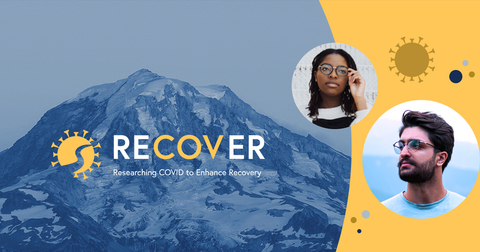As part of a massive nationwide effort to understand the condition commonly known as long COVID, Institute for Systems Biology is leading a multi-site Pacific Northwest consortium – http://www.pnwrecover.org/ – as part of the NIH-funded RECOVER initiative.
As part of a massive nationwide effort, Institute for Systems Biology (ISB) is leading a multi-site consortium for the NIH RECOVER (Researching COVID to Enhance Recovery) Initiative. The Pacific Northwest consortium is made up of ISB, Providence, Swedish, and University of Washington School of Medicine.
SEATTLE--(BUSINESS WIRE)-- As part of a massive nationwide effort to understand the condition commonly known as long COVID, Institute for Systems Biology (ISB) is leading a multi-site Pacific Northwest consortium – http://www.pnwrecover.org/ – as part of the NIH-funded RECOVER initiative. RECOVER, which stands for REsearching COVID to Enhance Recovery, is a large-scale research effort designed to ask why some people have prolonged symptoms following COVID-19, and to get real answers to help alleviate suffering as fast as possible.
This press release features multimedia. View the full release here: https://www.businesswire.com/news/home/20220302005352/en/

Institute for Systems Biology (ISB) is leading a multi-site Pacific Northwest consortium as part of the NIH-funded RECOVER initiative. (Photo: Business Wire)
“ISB is honored to work with our scientific and clinical peers to better understand why so many individuals experience chronic conditions following SARS-CoV-2 infection,” said ISB President Dr. Jim Heath, the principal investigator of the Northwest consortium. “This is something we have been studying and making some headway on over the past year, and we are very grateful to those individuals who are participating in our studies by giving both their time and blood.” (Important research by a collaborative group led by Heath that details four factors that can be predictive of long COVID at the initial point of COVID-19 diagnosis was recently published online by the journal Cell, and has received a tremendous amount of press coverage, including this story by the New York Times.)
ISB will work closely with Providence, Swedish, and University of Washington School of Medicine to recruit more than 900 patients throughout the greater Pacific Northwest over four years. Recruitment for the study has begun at Swedish and University of Washington School of Medicine, and will start at other sites in the near future.
Anyone interested in learning more about or participating in this study should visit pnwrecover.org.
The long-term effects of the virus are called post-acute sequelae of SARS-CoV-2 infection, or PASC. Long COVID is a form of PASC, and refers to symptoms that persist for weeks or months after acute infection. Common symptoms include inability to exercise, headaches, fatigue, “brain fog,” shortness of breath, anxiety, depression, fever, chronic cough, and sleep problems.
"As an infectious disease clinician and scientist caring for patients suffering from COVID-19, I've seen the devastating effects that long COVID can have, many weeks or months after SARS-CoV-2 infection. We are excited to partner with patients in our communities around the Pacific Northwest to work toward prevention and treatments for these debilitating symptoms,” said Dr. Jason Goldman, an infectious disease physician at Swedish. “If you are a patient who had COVID-19, we look forward to listening to your perspectives and experiences with SARS-CoV-2 or long COVID. Please consider participating in the effort to solve the puzzle of long COVID.”
More than 30 research teams across the country are part of the RECOVER Consortium, and the study has several goals, including characterizing the incidence, prevalence and long-term consequences of SARS-CoV-2 infection. The study also seeks to determine the risk factors and underlying mechanisms associated with PASC.
“As the UW Medicine lead investigator, we will enroll participants to better understand the clinical and immune profiles of individuals with PASC, particularly in underserved populations in the Pacific Northwest,” said Dr. Helen Chu, associate professor in Medicine, University of Washington School of Medicine. “Starting from early in the pandemic, we observed how persistent symptoms have continued to affect peoples’ lives long after their initial illness and we are looking forward to participating in this study with all our local partners.”
Data from the RECOVER study will include clinical information, laboratory tests, and analyses of participants in various stages of recovery following SARS-CoV-2 infection. With immediate access to data from existing, diverse study populations, it is anticipated researchers will be able to accelerate the timeline for this important research.
“Providence Everett admitted the nation’s first known case of COVID-19 in early 2020, so we’ve been at this longer than any other health system,” said Providence President and Chief Clinical Officer Dr. Amy Compton-Phillips. “We’ve seen hundreds of patients with long-term impacts of the disease. Providence’s participation in the RECOVER study, along with our incredible peers, will result in more information about the long-term effects of COVID, which will be incredibly helpful to our clinicians.”
About ISB
Institute for Systems Biology (ISB) is a Seattle-based non-profit biomedical research organization. We focus on some of the most pressing issues in human health, including aging, brain health, cancer, COVID-19, and many infectious diseases. ISB is an affiliate of Providence, one of the nation’s largest not-for-profit health care systems. Follow us at www.isbscience.org and on YouTube, Facebook, LinkedIn and Twitter.
View source version on businesswire.com: https://www.businesswire.com/news/home/20220302005352/en/
MEDIA CONTACT
Joe Myxter
ISB Director of Communications
jmyxter@isbscience.org
Source: Institute for Systems Biology
Institute for Systems Biology (ISB) is leading a multi-site Pacific Northwest consortium as part of the NIH-funded RECOVER initiative. (Photo: Business Wire)
View this news release and multimedia online at:
http://www.businesswire.com/news/home/20220302005352/en







